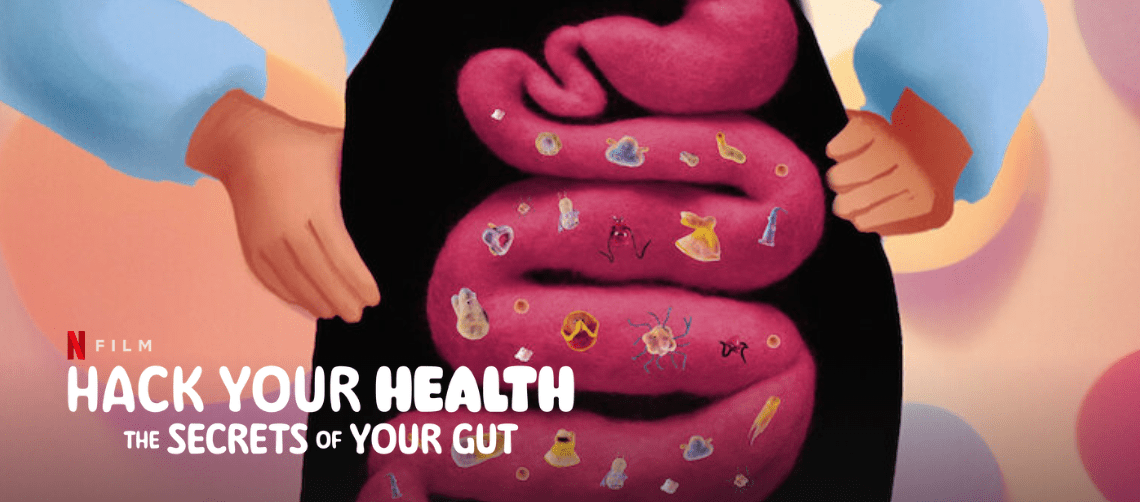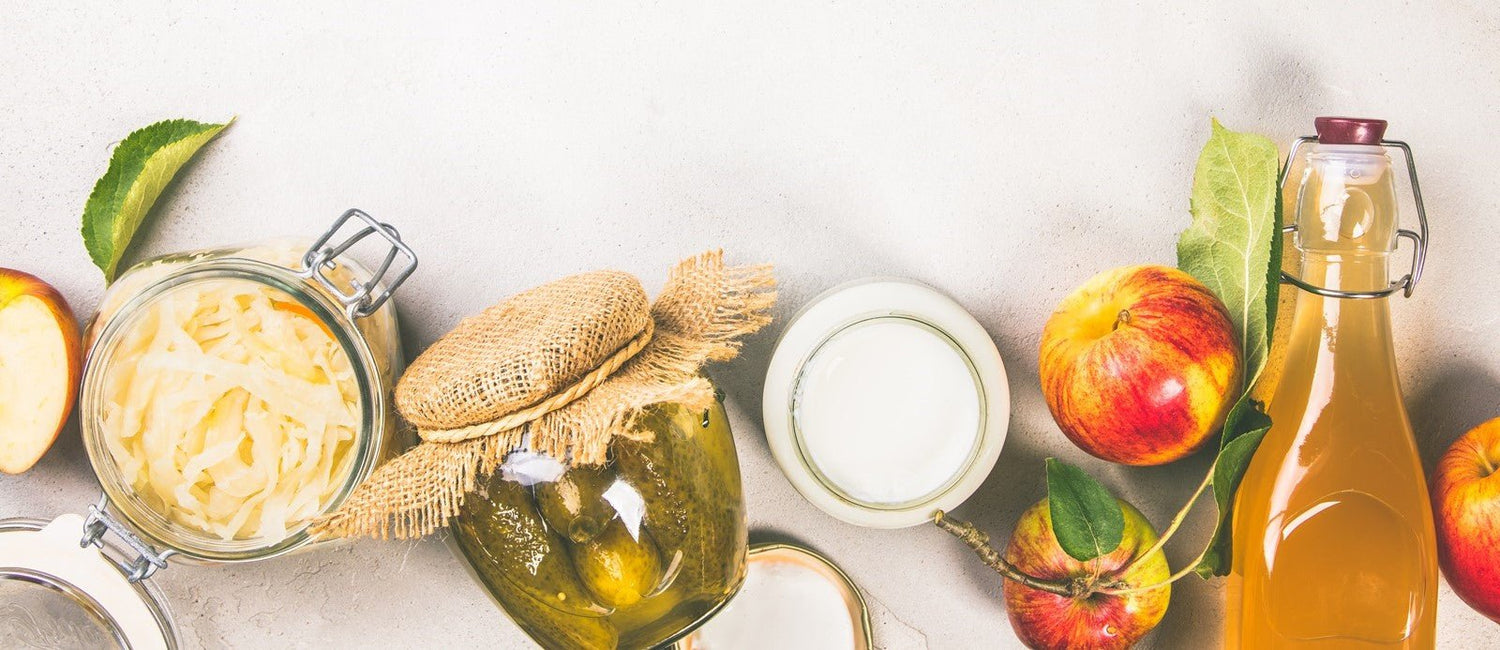Netflix recently released a new documentary focusing on the gut microbiome!
More and more people are suffering from diet-related illnesses. Navigating through the myriad of nutritional trends can be daunting any many of us wonder which foods and diets truly benefit them. The documentary underscores the personalized nature of nutrition and emphasizes the significant impact our microbiome - the community of trillions of microorganisms within our bodies - has on our overall health and well-being. Delving deeper into some of the documentary’s insights, we offer additional background information.
MyBioma Fact Check: 6 Netflix statements put to the test
-
"We are born largely without a microbiome. They only colonize us after we are born. If a baby is born vaginally, it is exposed to the mother's bacteria."
The placenta protects the fetus from infections and microorganisms in the womb. Recent scientific research highlights that birth marks the baby's initial exposure to microorganisms. On average, nearly 60% of a newborn's microbiome originates from the mother, while the rest comes from the surrounding environment. As highlighted in the documentary, babies delivered vaginally acquire their microbes primarily from vaginal and intestinal secretions. This microbial contact is absent in babies born via cesarean section. However, breastfeeding can compensate for this lack through the microbiome present in breast milk (2). -
“Another person’s stool samples can improve your health.”
Fecal transplantation offers a promising approach to replenishing a healthy microbiome and combatting harmful bacteria. Presently, the procedure is primarily employed for treating stubborn Clostridioides difficile infections and should exclusively be administered in a clinical environment under medical supervision (3). Scenes depicted in the Netflix documentary feature a woman ingesting capsules containing stool from their partner and sibling. Engaging in such self-experiments is strongly discouraged due to associated risks. Donors might inadvertently transmit not only beneficial microbes but also hazardous bacteria, such as Shiga toxin-producing Escherichia coli (4).
-
"Tailor-made probiotics can improve health in a very targeted way. Most over-the-counter probiotics do not contain strains of bacteria found in the digestive tract."
The FDA and WHO define probiotics as live microorganisms that confer health benefits to humans when administered in adequate quantities. Probiotics bolster the immune system, generate beneficial substances such as organic acids and antimicrobial compounds, interact with other gut bacteria, fortify the intestinal barrier, and produce essential enzymes for various bodily functions. Commonly utilized probiotics belong to the genera Lactobacillus, Bacillus, Bifidobacterium, and Saccharomyces, and they do inhabit the digestive tract. However, selecting high-quality probiotics is crucial, as many products on the market lack proven efficacy. While some studies suggest positive effects, further research is warranted to ensure individual therapeutic outcomes (5–7).
-
“Fermented foods are the original probiotics. They are full of different bacteria.”
The documentary illustrates the production of vegetables fermented in brine, a practice dating back centuries as one of the oldest food preservation methods. In particular, lactic acid bacteria (lactobacilli), which occur naturally on untreated vegetables, multiply during the fermentation process and produce vitamins, minerals and antimicrobial substances. Fermentation offers dual benefits: firstly, by ingesting these live bacteria (probiotics), we enhance the diversity of our gut microbiome. Secondly, fermentation renders the food more easily digestible and increases the availability of essential nutrients to our bodies (8,9).
Tip: When purchasing, ensure you opt for natural and unpasteurized products, or consider fermenting them yourself! Have you discovered our recipe for homemade kimchi yet?
-
"The key is to eat as many different types of plants as possible, in every form. Food for the microbes!"
The more diverse range of vegetables and fruits you consume, the better it is for your gut health. Why? Because it enhances the diversity of bacteria in your gut (10). A healthy gut consists of a vibrant array of different bacteria. Conversely, a lack of diversity in the gut flora raises the risk of various diseases. Hence, strive to include a colorful assortment of vegetables, fruits, nuts, seeds, legumes, whole grain products, and probiotic foods like sauerkraut, natural yogurt, or kefir in your diet. When making dietary changes, it's essential to proceed gradually and incrementally increase fiber intake so that your gut bacteria can adapt.
Tip: Different types of vegetables in small quantities on your plate are better than lots of vegetables of just one type. In our recipe e-book "Microbiome Food" there are over 40 recipes for a healthy intestinal microbiome and useful knowledge about how foods affect your intestinal bacteria. Buy now.
-
"If you stop eating dietary fiber, the gut microbes will start eating the mucus lining as a backup food source."
Discover the secrets of your own gut microbiome!
Curious about the unique composition of your own gut microbiome? With the myBioma microbiome test, you can find out which bacteria are associated with which health conditions and what you can do to improve your health and well-being. Conveniently conducted from the comfort of your home, the test is backed by rigorous scientific methods and cutting-edge technologies. Order your test here.
Were there any statements in the documentary that left you puzzled? What topics would you like us to provide more information on? Send us a message at service@mybioma.com or on Instagram. We look forward to hearing from you!
References
- Kennedy KM, de Goffau MC, Perez-Muñoz ME, et al. (2023). Questioning the fetal microbiome illustrates pitfalls of low-biomass microbial studies. Nature. 613(7945):639–49.
- Bogaert D, Beveren GJ van, Koff EM de, et al. (2023). Mother-to-infant microbiota transmission and infant microbiota development across multiple body sites. Cell Host Microbe. 31(3):447-460.e6.
- Minkoff NZ, Aslam S, Medina M, et al. (2023). Fecal microbiota transplantation for the treatment of recurrent Clostridioides difficile (Clostridium difficile). Cochrane Database Syst Rev. 4(4):CD013871.
- DeFilipp Z, Bloom PP, Torres Soto M, et al. (2019). Drug-Resistant E. coli Bacteremia Transmitted by Fecal Microbiota Transplant. N Engl J Med. 381(21):2043–50.
- Butel MJ. Probiotics, gut microbiota and health. (2014). Médecine Mal Infect. 44(1):1–8.
- Sanders ME, Merenstein DJ, Reid G, et al. (2019). Probiotics and prebiotics in intestinal health and disease: from biology to the clinic. Nat Rev Gastroenterol Hepatol. 16(10):605–16.
- Suez J, Zmora N, Segal E, Elinav E. (2019). The pros, cons, and many unknowns of probiotics. Nat Med. 25(5):716–29.
- Dimidi E, Cox SR, Rossi M, Whelan K. (2019). Fermented Foods: Definitions and Characteristics, Impact on the Gut Microbiota and Effects on Gastrointestinal Health and Disease. Nutrients. 11(8):1806.
- Şanlier N, Gökcen BB, Sezgin AC (2019). Health benefits of fermented foods. Crit Rev Food Sci Nutr. 59(3):506–27.
- van der Merwe M. (2021). Gut microbiome changes induced by a diet rich in fruits and vegetables. Int J Food Sci Nutr. 72(5):665–9.
- David LA, Maurice CF, Carmody RN, et al. (2014). Diet rapidly and reproducibly alters the human gut microbiome. Nature. 505(7484):559–63.
- Martens EC, Neumann M, Desai MS. (2018). Interactions of commensal and pathogenic microorganisms with the intestinal mucosal barrier. Nat Rev Microbiol. 16(8):457–70.






3 comments
Vielen Dank für die umfassende Aufklärung. Sie haben mir sehr geholfen.
Hi Armon,
danke für deinen Kommentar und dein Feedback! Es ist völlig normal, nicht nur „gute“ Bakterien im Darm zu haben. Problematisch wird’s erst, wenn das Gleichgewicht nicht mehr stimmt – also wenn zu wenige der „guten“ Bakterien vorhanden sind. Eine Ernährung, die aus viel Zucker, gesättigten Fettsäuren (befinden sich vor allem in tierischen Produkten) und hochverarbeiteten Lebensmitteln besteht, fördert potenziell schädliche Bakterien. Aber auch Stress, Schlafmangel, zu wenig Bewegung, Alkohol und Rauchen haben einen negativen Effekt auf das Darm-Mikrobiom. Um ein ausgewogenes, diverses Mikrobiom zu fördern, helfen eine ballaststoffreiche Ernährung mit viel buntem Gemüse und Obst, Vollkornprodukten, Hülsenfrüchten, Nüssen, Samen, Omega-3-Fettsäuren und ausreichend Protein, sowie ein gesunder Lebensstil. Bitte wende dich an eine Ernährungsfachkraft, bevor du eine restriktive Diät wie eine SCD durchführst. Das langfristige Weglassen ganzer Lebensmittelgruppen kann nämlich oft mehr Schaden als Nutzen bringen, insbesondere wenn keine nachgewiesene Relevanz dafür besteht.
Liebe Grüße
Carina von myBioma
Interessant wäre, wovon sich die schlechten Bakterien ernähren und was man am besten tut, wenn sie bereits den Darm besiedeln. Das hat mir auch in der mybioma Analyse gefehlt. Negative Bakterien sind vorhanden aber abgesehen von Ernährungsempehlungen für ein vielfältiges Biom würde nicht auf negative Bakterien eingegangen. Bspw. ist eine SCD sinnvoll, ohne die entsprechenden Darmkrankheiten zu haben, allerdings andere chronische Krankheiten, die laut Netflix Doku auf ein unausgeglichenes Mikrobiom zurückgehen?